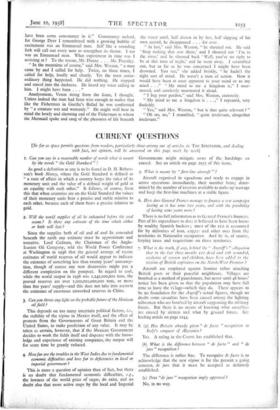CURRENT QUESTIONS
[So far as space permits questions from readers, particularly those arising out of articles in THE SPECTATOR, and dealing with fact, not opinion, will be answered on this page week by week] I. Can you say in a reasonable number of words what is meant by the words " the Gold Standard " As good a definition as any is to be found in D. H. Robert- son's book Money, where the Gold Standard is defined as " a state of affairs in which a country keeps the value of its monetary unit and the value of a defined weight of gold at an equality with each other." It follows, of course, from this that when countries are on the Gold Standard the values of their monetary units bear a precise and stable relation to each other, because each of them bears a precise relation to gold.
2. Will the world supplies of oil be exhausted before the cod seams ? Is there any estimate of the time which either or both will last ?
Since the supplies both of oil and of coal lie concealed beneath the earth any estimate must be approximate and tentative. Lord Cadman, the Chairman of the Anglo- Iranian Oil Company, told the World Power Conference at Washington in 1936 that the general average of recent estimates of world reserves of oil would appear to indicate the existence of something less than twenty years' consump- tion, though of course any new discoveries might put a different complexion on the prospect. In regard to coal, while the world output in 1936 was 1,240,000,000 tons, the proved reserves are over i,000,000,000,000 tons, or more than Boo years' supply—and this does not take into account the estimates of enormous unworked reserves in China.
3. Can you throw any light on the probable future of the Mexican oil field ?
This depends on too many uncertain political factors, i.e., the stability of the regime in Mexico itself, and the effect of protests from the Governments of Great Britain and the United States, to make prediction of any value. It may be taken as certain, however, that if the Mexican Government decides to work the fields itself and dispense with the know- ledge and experience of existing companies, the output will for some time be greatly reduced.
4. How far are the troubles in the West Indies due to fundamental economic difficulties and how far to deficiencies in local or imperial government ?
This is more a question of opinion than of fact, but there is no doubt that fundamental economic difficulties, e.g., the lowness of the world price of sugar, do exist, and no donbt also that more active steps by the local and Imperial Governments might mitigate some of the hardships so caused. See an article on page 1055 of this issue.
5. What is meant by " first-line aircraft " ?
Aircraft organised in squadrons and ready to engage in active operations immediately, their number being deter- mined by the number of reserves available to make up wastage and keep the first-line machines at a stable figure.
6. How does General Franco manage to finance a war campaign lasting as it has some two years, and with the possibility of lasting some years more ?
There is no full information as to General Franco's finances. Part of his expenditure to date is believed to have been borne by wealthy Spanish backers ; most of the rest is accounted for by deliveries of iron, copper and other ores from the territories in Nationalist occupation. And he is, of course, levying taxes and requisitions on those territories.
7. What is the truth, if any, behind the " Angriff's" allegation that in the last three months 122 dead and 116 wounded, exclusive of women and children, have been added to the victims of British explosives on the North-West Frontier ?
Aircraft are employed against frontier tribes attacking British posts or their peaceful neighbours. Villages are bombed as a method of punishment, but never until 48 hours' notice has been given so that the population may have full time to leave the village—which they do. There appears to be no foundation for the Angriff's actual figures, though no doubt some casualties have been caused among the fighting tribesmen who are bombed by aircraft supporting the military forces. But there is no means of knowing what casualties are caused by airmen and what by ground forces. See leading article on pa 8. (a) Has Britain already given " de facto " recognition to Italy's conquest of Abyssinia ?
Yes. A ruling in the Courts has established that.
(b) What is the difference between " de facto " and " de jure" recognition ?
The difference is rather fine. To recognise de facto is to acknowledge that the new regime is for the present a going concern, de jure that it must be accepted as definitely established.
(c) Does "de jure " recognition imply approval No, in no way. ge 1044.










































 Previous page
Previous page